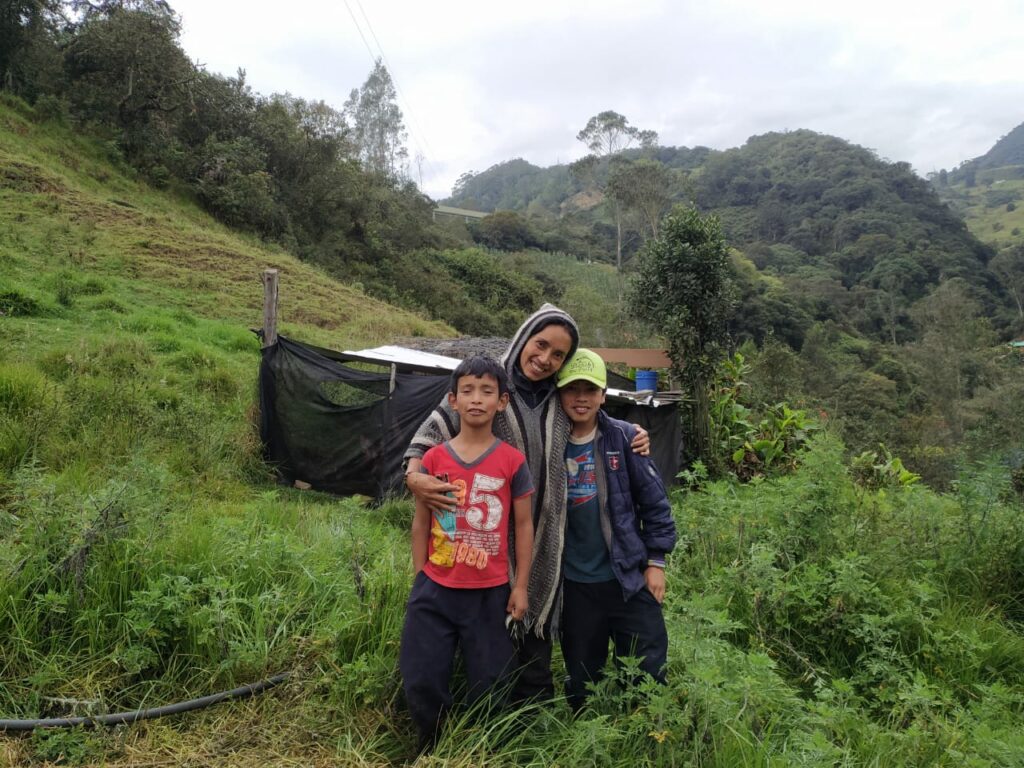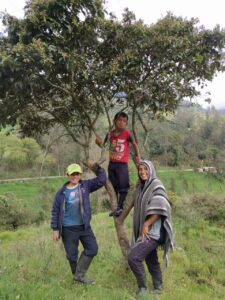A widowed Colombian farmer and her two young sons have gone viral on YouTube, to their own shock and surprise. Now their videos are educating viewers on the realities of life as a campesino.

The video opens with the sound of a chicken squawking, the camera panning shakily over the lush valleys of Chipaque, 45km south of Bogotá. The shot fades to Nubia Gaona Cárdenas and her two sons, Arley David, 14, and Jaime Alejandro, 9, and the family is waving, Hola!
“In this channel, we are going to teach you how to plant fruits, vegetables, herbs and much more,” the youngest says, breathlessly. “Let’s make this viral so that no one has to go to bed without eating.”
Somehow, the call to action was heard by the masses. Since being uploaded at the end of April, the simple video had amassed more than 1.1 million views at the time of writing. The channel itself now has more than 300,000 subscribers, and the family is being flooded with orders for its USD$5 seed-and-soil starter packs.
Read our latest coverage on the coronavirus in Colombia
“When we uploaded the video we thought in one week we would have 50 orders, but right now we have so many that we know, with Gods’ help, we’re going to be able to deliver,” Cardenas told The Bogotá Post. She couldn’t even quantify the number of orders, as their WhatsApp had crashed under the demand, but she estimated she had more than 1,000. “By the time we reply to one person, a lot more orders have already come in.”
The idea to start a YouTube channel came from David, who loves to watch videos on the platform. The boys lost their father – the family’s breadwinner – to illness two years ago. “Before he died I hadn’t worked for 10 years, then out of nowhere I had no resources to provide for my family,” Cárdenas said. “It’s been really hard.”

The family has been going step-by-step since then, trying different ideas to get by. One constant lifeline has been neighbours Sigifredo Moreno and wife Juliana Zapata, who also own the social enterprise Huertos de la Sabana in Bogotá. They’d helped Cárdenas before with investment for crops, and with a job washing potatoes. So, when the pandemic began, she decided to bring her son’s idea to them.
“At the beginning, we laughed,” Moreno said. “Because I don’t even have social media, I don’t have Facebook, no Twitter, no Instagram, only WhatsApp.” Nevertheless, they decided to give it a go. Zapata would film and upload the video, Moreno would deliver the kits around Bogotá. “We thought it was going to be 50 to 100 kits, so we said, ‘Let’s get a sack of soil ready,’… But when we saw what was coming, we gasped.”
Moreno says he’s been told that the sheer speed that the video went viral was incredibly unusual, maybe even more unusual than winning the lottery. As of Thursday night, they’d replied to 5,634 chats on WhatsApp. They’ve had messages from as far afield as Israel, China, Russia and Oman. Fake Nubia e hijos accounts popped up. They’ve had to partner with three different delivery services. And they’ve moved to digging up soil on his property to meet the demand. “This got out of our hands – literally got out of our hands. But it’s a beautiful problem to have to fix,” Moreno said. By Wednesday, Moreno – a civil engineer by trade – had a website set up to take orders.
Cárdenas is taking 80 percent of the profits of the seed kits, while 20 percent is going to Huertos de la Sabana. In her video, she explains some of the difficulties of being a farmer in Colombia, and how sometimes the price they get for vegetables doesn’t even justify taking them out of the ground. According to the World Bank, extreme poverty was over three times higher in rural areas of Colombia than in urban areas in 2017. More than 15% of the rural population lives in extreme poverty, while 36% live in moderate poverty, defined as individuals living on less than USD$5.50 per day.
Moreno learned the harsh realities of this when he partnered with Cárdenas and her husband years ago on some farmland. From his USD$7,000 investment, they were only able to sell USD$1,500 worth of crops that year. “When I went to sell that harvest, which was potatoes, they paid me 150 pesos per pound. But when I went to the markets they were charging 2,000 pesos per pound – that’s a 2,000% difference that the intermediaries are adding.” The disappointing prices are also at the mercy of seasonal oversupply of certain vegetables, and the consumer’s expectation of a perfect-looking product. We don’t like to buy ugly veggies.
Moreno started investigating the supply chain and discovered there were often up to eight intermediaries between farmer and consumer, each of which increased the cost. Huertos de la Sabana was started to try to avoid those intermediaries so that farmers might get a fair price. “This is not an equal equation for everyone because the people at the farms are the ones who are breaking their backs under the sun, that job is really, really hard, and they are not getting fair remuneration,” Moreno said.
The organisation is trying to negotiate with sellers to always buy at a fair price (although Moreno says “you need the birth certificate of Jesus” to talk to the big chains). Change also needs to come in the form of policy, a prospect Moreno sees as unlikely as the sector is very politicised. “So they name a person who has never seen the fields or worked the fields.”
They are also trying to educate the public about the plight of campesinos and the importance of being socially responsible and sustainable consumers. So for now, the most important thing for Moreno is that people keep watching and subscribing to hear Cárdenas’ story, as well as upcoming videos with other campesino families.
And as for the ideas-man David, who this all sprung from? He’s just grateful to the public. “I’m so happy, because we weren’t expecting the support we’ve been getting, and we’ve had so many people helping us.”
These are all the correct social media accounts:
YouTube: Nubia e hijos
Facebook: Nubia e hijos
Instagram: nubiaehijos
Twitter: @nubiaehijos
By Jessy Edwards and Juan Felipe Bohórquez





